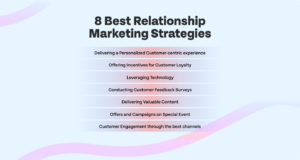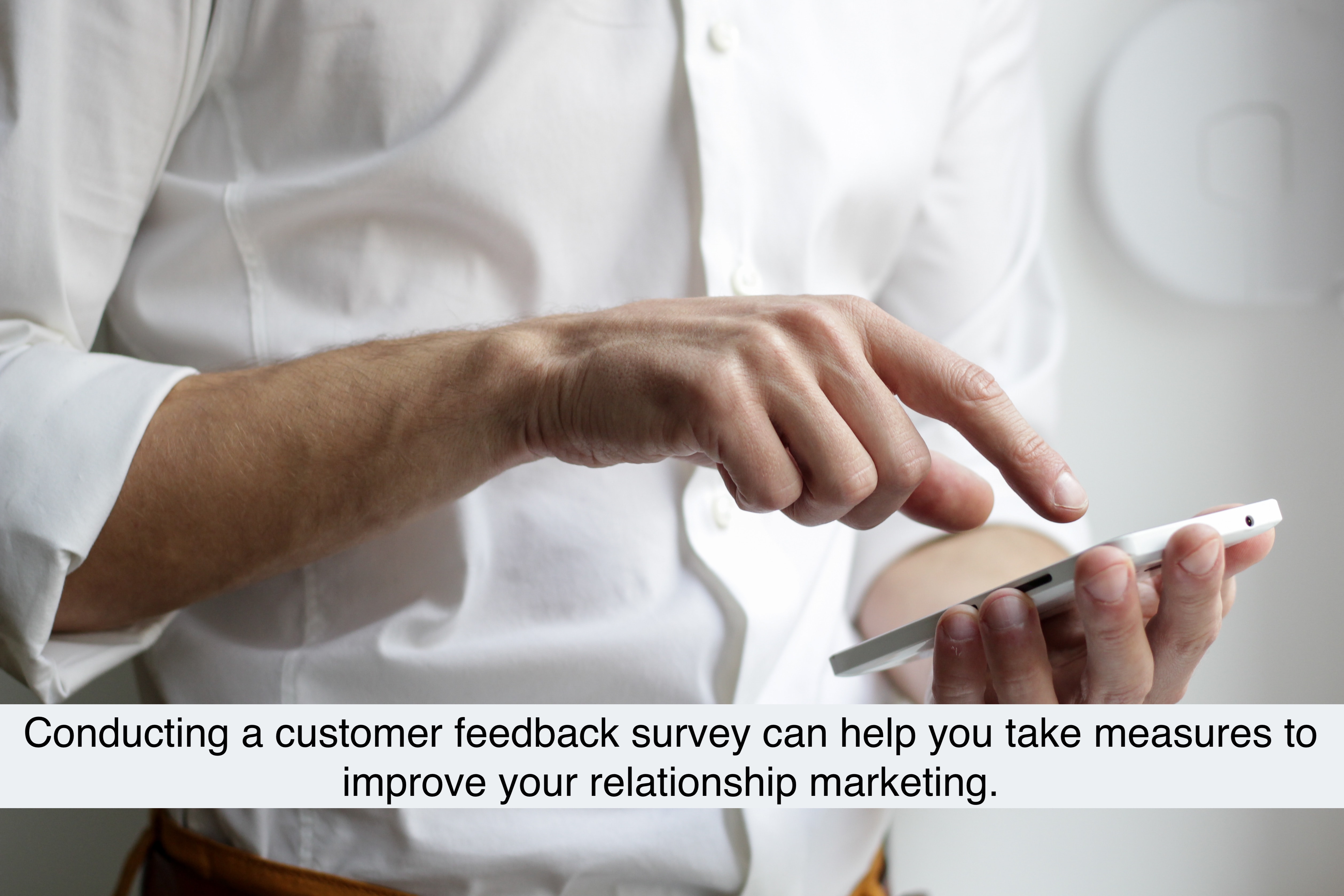Others
What is Relationship Marketing - The Ultimate Guide for 2025
Article written by Athira Unnikrishnan
Just a plain soul enthralled by the power of words and the aroma of food!
16 min read
2 January 2026

Picture this: a mere 5% boost in customer retention can skyrocket a company’s profitability by up to 75%. Astonishing, isn’t it? This statistic, brought to light by Bain & Company and Earl Sasser of Harvard Business School, isn’t just a number; it’s a testament to the power of nurturing lasting customer relationships.
In today’s fast-paced market, the secret sauce to success isn’t just about making a sale and creating a bond. Relationship marketing takes us beyond the transactional approach, deepening into building trust, understanding, and a sense of community with our customers. It’s about transforming a one-time buyer into a lifelong advocate who believes in your products or services and champions them in their circles.
So, why does this matter to you and your business? Because in the world of relentless competition and ever-evolving consumer needs, thriving brands put their customers at the heart of their journey. Let’s embark on this journey together, discovering how relationship marketing can be your ace in creating not just customers but partners in your brand’s story.
What is Relationship Marketing?
In the simplest of words, we can define relationship marketing as a dimension of marketing that emphasizes fostering long-term customer engagement and loyalty by cultivating a deep-rooted relationship with them. Instead of going for short-term achievements and sales plans, relationship marketing focuses on long-term relationships that help generate leads through word of mouth, one of the most efficient ways.
Why is Relationship Marketing Important?
Stats say that 80 percent of the future profits of an enterprise will be from just 20 % of the existing customers. Retaining customers is pivotal to the growth of an organization. Customer Retention comes with creating a long-term relationship with the buyers, and this is where relationship marketing comes into play.
With robust relationship marketing strategies in place, you can keep in touch with your customers constantly, understand how they use your products, what they expect from the products, and even know about their changing needs. This will help you tweak your products and services accordingly.
Well, that’s not all! As I mentioned, when a loyal, long-term relationship is established with your customers, they are bound to act as your brand ambassadors through positive word of mouth, helping you procure new customers.

Best Example of Relationship Marketing
Before we get into the nuances of relationship marketing, something drove me to write this topic, This was a couple of years back. I was looking for some pizza-making videos and stumbled upon this Domino’s Ad titled ‘Pizza Turnaround.’ Quite intrigued, I started to watch the ad video. So, here’s a vague picture of how it went.
The ‘Domino’s Effect’ on Customer Relationship
The camera zooms in on strongly resentful reviews one after the other. I remember reading this phrase – ‘the pizza was cardboard.’ For a moment, I was confused, and I rechecked if this was the brand’s ad or a competitor’s?! Well, yes, it was indeed Domino’s.
Who would make an ad featuring such bad reviews? Wouldn’t it have a deteriorating effect on the brand? This unconventional ad was tickling my fancy, and I had to get to the bottom. Later, they show the President, the head chef, and the employees openly admitting their mistake and realizing how important it was for them to deliver scrumptious pizzas thereon. Now, you would think that would be ‘The end,’ but no, it was not.
They then show the team huddling up, creating new and improved menus, and preparing them. And then enters the best bit! The head chef and the sous chef set out on a mission to find their harshest critics with a bag full of freshly made pizzas. They go from door to door, handing each of their critics a slice. The customers are ‘wowed’ by the newly revamped pizza and instantly become the brand’s flag bearers from being their harshest critics!
Well, without a shadow of a doubt, what Domino’s took was indeed a risky step. But oh boy! The result was worth it. These self-effacing ads struck the right chord with the audience. The ad helped the brand procure new customers and retain many existing customers owing to its unfeigned and transparent outlook.
But that was not all; the brand took off with such marketing campaigns and leveraged its digital channels to reach more audiences. Since then, there has been no looking back, and Domino’s customer base has grown stronger and stronger.
Now, that’s an amazing example of relationship marketing!
All these unorthodox campaigns have helped Domino’s tap into the possibilities and even establish loyal, long-term relationships with their customers. Creating a strong relationship with your consumers is one of the biggest challenges in this marketing era. So, here’s delving into the ‘whats’ and ‘hows’ of relationship marketing to help you form that strong customer base you’ve always dreamt of.
Create Exceptional Marketing Strategies with the help of SurveySparrow.
Try it for free now.
14-day free trial • Cancel Anytime • No Credit Card Required • No Strings Attached
Other Examples of Relationship Marketing
Relationship marketing focuses on building long-term relationships with customers rather than prioritizing short-term sales or transactions. This strategy aims to create customer loyalty, encourage repeat business, and foster personal connections between a brand and its customers. Here are several examples illustrating how businesses can implement relationship marketing:
- Loyalty Programs:
Example: A coffee shop chain offers a loyalty card that rewards customers with a free coffee after a certain number of purchases. This encourages repeat visits and makes customers feel valued for their loyalty.
- Personalized Communication:
Example: An online retailer uses customer purchase history and browsing behavior to send personalized product recommendations and offers via email. This tailored communication shows customers that the brand pays attention to their preferences and seeks to provide value.
- Customer Feedback and Engagement:
Example: A software company regularly sends out surveys to gather feedback on its products and uses this input to make improvements. They also engage with customers through forums and social media, creating a community around their product.
- After-Sales Support and Services:
Example: An electronics manufacturer offers extended warranties, free repairs within the warranty period, and a 24/7 customer service hotline. This comprehensive after-sales support reassures customers about their purchase and enhances brand loyalty.
- Exclusive Offers for Repeat Customers:
Example: A travel agency provides returning customers with access to exclusive deals and early booking discounts. This rewards repeat business and incentivizes customers to maintain their relationship with the brand.
Customer Appreciation Events:
Example: A local bookstore hosts an annual event for its most loyal customers, featuring author signings, free merchandise, and previews of upcoming releases. This event shows appreciation for the customers’ loyalty and strengthens their emotional connection to the brand.
- Educational Content and Workshops:
Example: A health and wellness brand offers free workshops and online content about nutrition, exercise, and well-being. The brand builds a deeper relationship with its customers by adding value beyond their products.
- Community Involvement and Social Responsibility:
Example: A company engages in local community projects and supports sustainability initiatives, sharing these efforts with customers through their marketing channels. Customers who value social responsibility are more likely to develop a strong, positive relationship with the brand.
Benefits of Implementing Relationship Marketing
Implementing relationship marketing offers several key benefits that can significantly enhance the success and sustainability of a business:
- Increased Customer Loyalty: Businesses encourage repeat business by focusing on building long-term relationships. Loyal customers are less likely to switch to competitors, providing a stable revenue stream.
- Enhanced Customer Lifetime Value (CLV): Relationship marketing aims to increase the total amount a customer spends over their lifetime. Maintaining a long-term relationship makes customers more likely to make repeated purchases and try new products or services.
- Word-of-Mouth Marketing: Satisfied customers often become brand advocates. They recommend the products or services to friends and family, providing effective and cost-efficient word-of-mouth marketing.
- Reduced Marketing Costs: Acquiring new customers can be expensive. By retaining existing customers, companies can reduce the costs associated with marketing and advertising to new audiences.
- Better Market Insights: Regular interactions with long-term customers provide valuable feedback and insights into consumer preferences and trends, allowing businesses to innovate and improve their offerings effectively.
- Competitive Advantage: In markets where competitors focus primarily on acquiring new customers, a strong relationship marketing strategy can differentiate a business, making it more attractive to consumers seeking reliable and personalized services.
- Emotional Connection: Building emotional connections with customers can lead to higher satisfaction and trust, making it more difficult for competitors to disrupt these established relationships.
In summary, relationship marketing enhances customer satisfaction and loyalty and translates into tangible business benefits like increased revenue, reduced costs, and valuable market insights. It creates a win-win situation where customers feel valued and businesses enjoy sustained growth.

8 Best Relationship Marketing Strategies
Strategies ought to be flawless when it comes to relationship marketing. Here are some of the best relationship marketing strategies that you can help you up your game:
- Delivering a Personalized Customer-centric experience
- Offering Incentives for Customer Loyalty
- Leveraging Technology
- Conducting Customer Feedback Surveys
- Delivering Valuable Content
- Offers and Campaigns on Special Event
- Customer Engagement through the best channels
- Making the most of Social Media
1. Deliver a personalized, customer-centric experience
The customer is King. No second thoughts! Though a constant for centuries, this market mantra has never made more sense until now. A customer-centric approach should be your main focus rather than the products or services alone. Show your customers that they are valued. Please provide them with personalized attention. Here are some tips for delivering a customer-centric experience:
- See to it that your new product or feature pertains to the customer’s problems and expectations.
- Create Ads that will truly interest the customers.
- Identify the potential issues that can arise for each section of your customers and resolve them.
- Give them instant answers to their questions through Instagram DM or solve customer service-related issues through a Facebook Messaging Bot.
2. Offer Incentives for Customer Loyalty
If you are set on creating a relationship with your customer, then know it does not form with purchasing. To create long-term relations and brand loyalty, you should keep engaging with your customers even after the purchase.
This relationship marketing strategy has been trending for a while, pleasing both enterprises and customers. Rewards, discounts, and incentives for customer loyalty! You can give your customers discounts, offers, or even personalized suggestions on repurchase. Loyalty programs like referring the product to relatives and friends are also a great way to engage customers and gauge loyalty. Providing incentives as a part of the program mentioned above can also help promote it among customers.
3. Leverage Technology
Gone are those days when you have to store a big bulk of data in Excel sheets. ERP and CRM solutions are in vogue now, helping enterprises keep a reliable, central repository of business functions and customer data that can be accessed in seconds.
Enterprise Resource Management (ERP) enables the integration of multiple functions of a company into a single system and provides access to the company’s decision-makers.
Customer Relationship Management (CRM) is about collecting and storing customer details, personal information, or purchase patterns.
Both management systems help enterprises make their sales and marketing processes more efficient, helping them gain more profit.
SAP, Microsoft, Oracle, etc., are the popular ERP platforms, while Salesforce and Microsoft Dynamics are the lead players in CRM systems.
Do you want to stay ahead of the game? Then, invest in technology, procure reliable customer data, and amp up your relationship marketing about it.
4. Conduct regular Customer Feedback Surveys.

For a customer relationship to work, you must resolve all possible customer issues with your product/service. There are certain questions that need an answer.
‘What does your customer expect from your product?’
‘What do they like the most about your product?’
‘Is there something that they dislike about your product?’
And the answers can be procured through feedback. Conducting a customer feedback survey or loyalty gauging NPS surveys regularly can work wonders in knowing your customer’s mind. You can take measures to improve your relationship marketing based on this feedback. I know making the questionnaire and distributing it among your customers can be pretty time-consuming and prone to many errors. No issues. You have efficient, cost-effective tools like SurveySparrow to take your feedback game a notch higher!
5. Provide Valuable Content
‘Content is King’ is one of the most popular marketing quotes by Bill Gates, and I can’t find a more befitting quote that signifies the importance of content.
Content has the power to create a great customer relationship. And that’s exactly what became the game-changer for Domino’s: their ‘pizza turnaround’ videos.
Valuable content should be able to address customer pain points and provide solutions and information in areas that interest them. Such a step can even help connect with customers emotionally and increase brand awareness, which in turn enables you to gain loyal brand advocates.
6. Plan Interesting offers or campaigns for special events.
Make the most out of special events and festive seasons to build a relationship with your customers. You could launch some campaigns, conduct an event, include seasonal offers, or do something as simple as sending a gift card. These gestures show that you care about your customers. They will cherish the experience, and is going to give a major boost to your relationship marketing strategies.
7. Engage with customers through the best channels.
Demographics is an important aspect that helps delve deeper into your customer base. So, identifying the right platform for each demographic is imperative to extend your reach. For instance, Instagram appeals to a large section of the younger audience. By aiming at such channels, you can actually connect and engage better with your customers. This will help your brand cultivate a relationship with your consumers, thus paving the way to loyalty.

8. Make the most of social media.
Social media is easily one of the best ways to create a relationship with your customer. Platforms like Twitter, Facebook, etc. help amp up communication processes, helping you retain existing customers and generate new leads.
Social media handles for your brand would make a huge difference in your business. You can share posts on interesting topics, conduct polls, and other fun activities about your field. This is a sure-shot step that can help boost customer engagement. But that’s not all; every like and share that comes along with your posts increases your reach and popularity.
When that’s the case, you need to be particular about the content you share on social media. Ensure you don’t post too much or too little content; the golden rule is to deliver concise and original content. Building a simple content calendar, or using a social media scheduler, helps you keep a steady cadence while prioritizing original content. Also, make sure immediate attention is given to your followers’ comments, messages, and queries. Undoubtedly, social media can be the new home for marketing if it is rightly leveraged.
Create Exceptional Marketing Strategies with the help of SurveySparrow.
Try it for free now.
14-day free trial • Cancel Anytime • No Credit Card Required • No Strings Attached
How can SurveySparrow Help Leverage Relationship Marketing?

SurveySparrow can play a pivotal role in customer relationship management by offering various tools and features that facilitate better communication, understanding, and customer engagement. Here’s how it can help:
- Customer Feedback Collection: SurveySparrow allows businesses to create and distribute surveys to gather customer feedback easily. This feedback is crucial for understanding customer needs, preferences, and areas of dissatisfaction.
- Personalized Surveys: The platform offers customized survey options, which can make customers feel more valued. Personalization in surveys can lead to higher response rates and more accurate data.
- Analytical Tools: SurveySparrow provides analytics to interpret survey data effectively. These insights can guide business decisions and strategies for improving customer relationships.
- Automation of Feedback Process: By automating the feedback process, SurveySparrow ensures regular interaction with customers, keeping the lines of communication open and consistent.
- Multi-Channel Distribution: Surveys can be distributed across various channels like email, social media, and websites, ensuring a wider reach and ease of customer access.
- Actionable Insights: The platform helps translate customer feedback into actionable insights, which can be used to improve products, services, and overall customer experience.
- Customer Satisfaction Tracking: Regular surveys help track customer satisfaction over time, giving businesses a clear picture of how their relationship with customers is evolving.
By leveraging these features, SurveySparrow can significantly enhance a company’s ability to manage and nurture customer relationships, leading to greater customer loyalty and business success.

Explore Deeper Customer Insights with SurveySparrow
A personalized walkthrough by our experts. No strings attached!
Winding Up!
Creating and implementing powerful relationship marketing strategies may not be as easy as it looks. The process can consume a large chunk of your time and effort, but let me tell you if you can pull it off, then there’ll be no turning back, provided that you follow the golden rule: follow-up and Update.

Thousands of brands trust SurveySparrow to turn feedback into growth. Try it free today!
Athira Unnikrishnan
Content Marketer at SurveySparrow.
Related Articles

Others
ALL YOU NEED TO KNOW ABOUT DREAMFORCE 2019
11 MINUTES
10 October 2019

Others
What is Market Research And How To Do It?
15 MINUTES
11 February 2021

Others
How to Add a WordPress Contact Form without Plugin?
7 MINUTES
27 September 2022

Others
Lead Scoring 2.0: Why Intent, Sentiment, and Behavior Change Everything
16 MINUTES
3 October 2025
